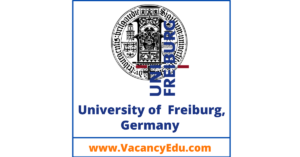University of Freiburg, Germany invites online Application for number of Fully Funded PhD Degree at various Departments. We are providing a list of Fully Funded PhD Programs available at University of Freiburg, Germany.
Eligible candidate may Apply as soon as possible.
(01) PhD Degree – Fully Funded
PhD position summary/title: PhD Research position for the project Thermoeelectric Energy Harvesting with Responsive Metamaterial Surfaces
The livMatS project “Thermoelectric Energy Harvesting with Responsive Metamaterial Surfaces – ThermoMetaS” aims to develop a 3D printable self-contained metamaterial system capable of harvesting thermal energy from its surroundings and acting autonomously to external temperature changes by altering its shape. The project is focused on development, implementation and miniaturization of thermal energy harvesters as actors. In a previous project (ThermoBatS), micro-thermoelectric generators (μTEG) with phase change materials (PCMs) as thermal buffers in the form of PCM-μTEG-PCM stacks have been developed mostly for energy harvesting purposes.
Deadline : 15.11.2022
(02) PhD Degree – Fully Funded
PhD position summary/title: PhD Research position for the project Chemically Fueled Adaptivity in Materials Systems
The project will deal with the chemical synthesis of modified naphthalenes and anthracenes for reversible storage of (singlet) oxygen as endoperoxides. These compounds will be modified for water solubility with charges and also equipped with handles for polymerization. Installation of photoswitches and photosensitizers will lead to reversible and switchable oxygen storage and release systems. Their loading and release properties will be studied and the incorporation into a demonstrator relying on pressure release systems will be analysed.
Deadline : 23.10.2022
View All Fully Funded PhD Positions Click Here
(03) PhD Degree – Fully Funded
PhD position summary/title: PhD Research Position (f/m/d) Microfluidic Methods for blood-based cancer diagnostics (Liquid Biopsy)
The Department of Microsystems Engineering (IMTEK) at University of Freiburg is one of the world’s largest academic institutes in this field. The Liquid Biopsy group, headed by Dr. Peter Jülg, belongs to the Laboratory of MEMS Applications (Prof. Dr. Roland Zengerle). Our research is focussed on new methods for molecular cancer diagnostics in body fluids.
Deadline : 30.11.2022
(04) PhD Degree – Fully Funded
PhD position summary/title: Doctoral Researcher in Near-Surface Geophysics
The advertised position is part of the DFG Research Unit “Fast and Invisible: Conquering Subsurface Stormflow through an Interdisciplinary Multi-Site Approach” (FOR 5288). The project work of the doctoral researcher will focus on the geophysical exploration of the shallow subsurface with focus preferential flow patterns in collaboration with several other researchers. We seek a highly motivated individual with keen interest in field work and data analysis.
Deadline : 30.11.2022
Polite Follow-Up Email to Professor : When and How You should Write
(05) PhD Degree – Fully Funded
PhD position summary/title: PhD Research position
Liquid crystal elastomers (LCEs) represent an interesting class of materials, as they can undergo significant dimensional changes when properly stimulated, in directions that can be programmed during fabrication, and are thus suitable for the realization of artificial structures with programmable mechanical response. We have developed a technology which allows a pixel-by-pixel definition of the alignment (and thus actuation direction) of these films, with a resolution of about 20 micrometers. This unique structuring capability gives us unparalleled flexibility in defining the two-dimensional actuation behavior of an LCE film. In this new project, we now propose to extend this concept into three dimensions, enabling the realization of bulk actuators which can modulate between multiple pre-determined shapes, with complete flexibility in defining the actuation direction in the bulk of the “crystal”. With high-resolution definition of the mechanical response of the bulk, we expect to be able to realize wide-ranging adaptive mechanical behavior in materials, all of which can be defined in the material design.
Deadline : Open until filled
(06) PhD Degree – Fully Funded
PhD position summary/title: PhD postion: “GALLISENSE: Innovative sensor development“
The livMatS GALLISENSE Project aims to provide a robust and scalable approach to empower material self-sensing, like state reporting and state switching by making use of a hydraulic readout systems based on Gallium liquid metal microfluidics. The material will be able to feel external stimuli, in form of mechanical deformation, such as a load being applied to the material, by displacement of the channel segments in the hydraulic system. In this project you will focus on developing an innovative passive sensing method, which uses the conductive properties of the gallium droplets to monitor the metal segments inside microfluidic channels, hence the state of the material and the presence of external stimuli continuously. To do this you will design resonators made of gallium droplets, in which the position change of the liquid metal segments will cause a variation either of the capacitance or of the inductance of the resonator. The liquid metal segments will work as an antenna so that the position changes can be interrogated similar to a configurable RFID tag and thus allow state querying from the outside without the need of additional electronics on the material side.
Deadline : Open until filled
Click here to know “How to Write an Effective Cover Letter”
(07) PhD Degree – Fully Funded
PhD position summary/title: PhD Research position for the project Chemistry of Triboelectric Materials and Fluorinated Polymers
The triboelectric effect can be used to power a functional materials system by harvesting mechanical energy from its surroundings. This project aims to develop a unique material pair for use in a triboelectric nanogenerator (TENG) for use in smart materials, rechargeable wearables and decentralized energy generation. The material pair in question are porous highly-fluorinated materials which are based on the unique Fluoropor Technology developed within the cluster. The second material investigated will be room-temperature liquid metals based on Gallium alloys. By harnessing the state-of-the-art 3D Printing capabilities of the clusters, small, integrated TENGs will be developed and assessed with the aim of providing this novel material design concept for integration of energy harvesting into a living materials system. The thesis will be part of an interdisciplinary research team which provides a holistic view on this emerging field in energy generation.
Deadline : 28.10.2022
(08) PhD Degree – Fully Funded
PhD position summary/title: PhD Research position for the project Gallisense – Giving Materials the Ability to Sense
If a material shall be aware of its surrounding, it must be able to query information about its physicomechanical state. Upon sensing an external load, a material can then respond by changing its physical or chemical structure in order to enforce or adjust its properties. This adaptation requires the capability to sense in the first place. The aim of this project is to provide a robust and scalable approach to empower material self-sensing, i.e., state reporting and state switching by making use of a hydraulic readout system based on Gallium liquid metal microfluidics, an emerging topic in the field of Advanced Microfluidics. This concept will allow the material to “remember” the stimulus, i.e., the applied load. The stimulus has changed something in the material which causes a permanent change to material’s memory. This effectively turns the material into, what is in computer science terms referred as a, a state machine. This project will provide an energy-autonomous, generally-applicable, fully-closed material sensory awareness concept based on a material system state machine thus providing a significant step towards fully-adaptive and autonomous materials.
Deadline : Open until filled
(09) PhD Degree – Fully Funded
PhD position summary/title: PhD Research position for the project ThermoMetas: Thermoelectric Energy Harvesting with Responsive Metamaterial Surfaces
The ability to harvest energy from its surrounding is one of the most important capability of a smart material. Energy is the fundamental prerequisite for a responsive and smart material. Interestingly, there are many sources of (non-conventional) energy which can be harvested. Thermal energy is among the most amply available sources of energy – however, it is also one of the most difficult to harvest in miniaturized systems. This project aims at the development of complex metamaterial systems made from functional materials which can undergo shape changes upon changes in ambient temperature. These thermally-induced shape changes can be used to harvest energy. The materials to be used are based on phase-change materials which can be 3D printed. These materials will be processed using top-of-the-line Additive Manufacturing (AM) infrastructure available in the cluster. The aim is to substantially enrich the material landscape in smart materials with the aim of developing self-sustained systems with the ability to harvest thermal energy for distributed systems, e.g., in smart health, ambient assisted living, IoT or distributed sensing systems.
Deadline : Open until filled
About The University of Freiburg, Germany –Official Website
The University of Freiburg , officially the Albert Ludwig University of Freiburg is a public research university located in Freiburg im Breisgau, Baden-Württemberg, Germany. The university was founded in 1457 by the Habsburg dynasty as the second university in Austrian-Habsburg territory after the University of Vienna. Today, Freiburg is the fifth-oldest university in Germany, with a long tradition of teaching the humanities, social sciences and natural sciences and technology and enjoys a high academic reputation both nationally and internationally. The university is made up of 11 faculties and attracts students from across Germany as well as from over 120 other countries. Foreign students constitute about 18.2% of total student numbers.
The University of Freiburg has been associated with figures such as Martin Heidegger, Hannah Arendt, Rudolf Carnap, David Daube, Johann Eck, Hans-Georg Gadamer, Friedrich Hayek, Edmund Husserl, Edith Stein, Friedrich Meinecke, Max Weber, Paul Uhlenhuth and Ernst Zermelo. As of October 2020, 22 Nobel laureates are affiliated with the University of Freiburg as alumni, faculty or researchers, and 15 academics have been honored with the highest German research prize, the Gottfried Wilhelm Leibniz Prize, while working at the university.
Disclaimer: We try to ensure that the information we post on VacancyEdu.com is accurate. However, despite our best efforts, some of the content may contain errors. You can trust us, but please conduct your own checks too.
Related Posts
- PhD Degree (15)-Fully Funded at University of Southern Denmark, Denmark

- PhD Degree (24)-Fully Funded at Forschungszentrum Julich, Germany

- PhD Degree (08)-Fully Funded at Vrije University Amsterdam, Netherlands

- PhD Degree (27)-Fully Funded at Nottingham Trent University (NTU), England

- PhD Degree (24)-Fully Funded at University of Oslo, Norway

- PhD Degree (04)-Fully Funded at Masaryk University, Czech Republic

- PhD Degree (29)-Fully Funded at University of Oslo, Norway

- PhD Degree (13)-Fully Funded at University of Stavanger, Norway

- 08 PhD Degree-Fully Funded at EMPA, Zurich, Switzerland










